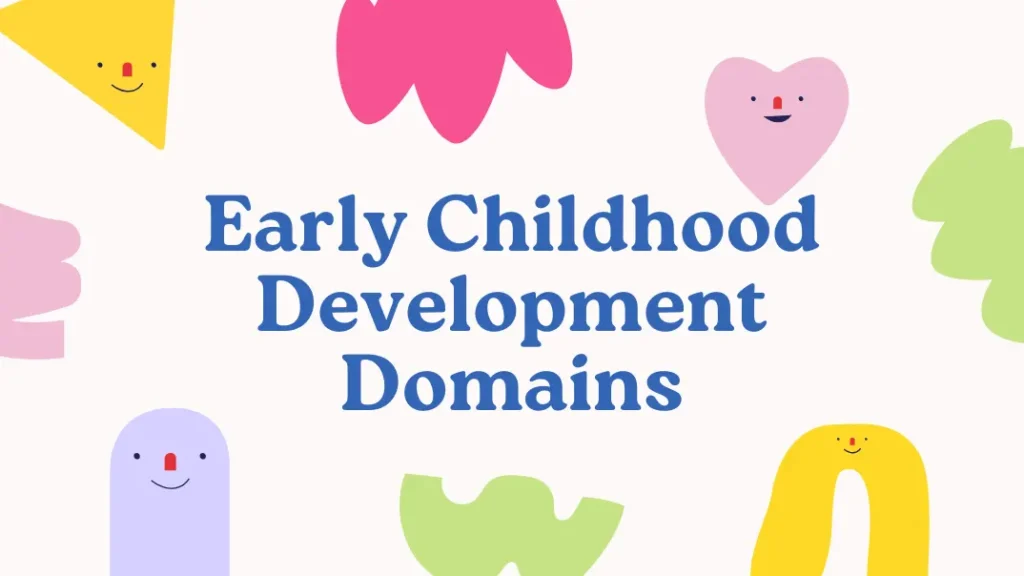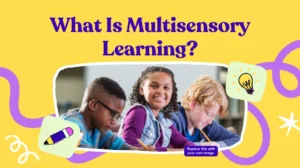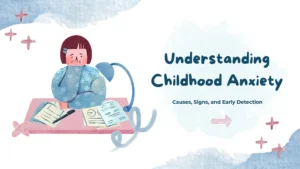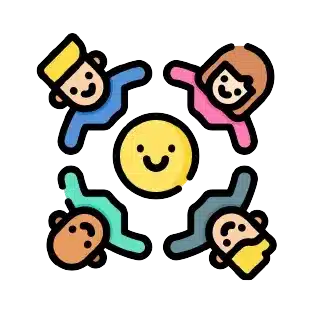As a parent, educator, or caregiver, you may have heard of “early childhood development domains” in various contexts. But what does it mean, and why should you care? Early childhood is a critical time for a child’s growth, and understanding these domains can make a significant difference in fostering a child’s well-being.
It encompasses the growth and maturation children undergo from birth to age eight. This period is foundational, setting the stage for lifelong learning and success. Early childhood development is often broken down into several key domains, each contributing to a child’s overall growth and well-being. Understanding these domains helps parents, educators, and caregivers create the best possible environment for a child’s development.
Overview of Early Childhood Development
Early childhood development domains is how young children acquire the physical, cognitive, and emotional skills necessary for survival, learning, and thriving. During the first eight years of life, children’s brains grow rapidly, forming millions of new connections as they respond to the environment around them.
Genetic factors and environmental conditions deeply influence the development during this stage. Genes set the potential for development, but a child’s experiences—especially those in the early years—determine how those genes are expressed. Healthy early development is linked to positive outcomes in school, work, and life, as well as mental and physical health in adulthood.
The Key Early Childhood Development Domains
Experts talking about early childhood development often refer to five distinct domains: cognitive, physical, social, emotional, and language development. These childhood development domains are interrelated, meaning progress in one area often promotes growth in another.
Children develop across several domains, each influencing the others in a complex way. Let’s explore these development domains in more detail.

1. Cognitive Development Domains
Cognitive development refers to a child’s ability to think, reason, and understand. Cognitive development domains involves attention, memory, problem-solving, planning, and decision-making, which form the foundation for later academic learning and intellectual growth.
Key Milestones in Cognitive Development
- Infancy (0-2 years): Cognitive development is primarily sensory and motor-based during infancy. Infants learn about their environment through touch, sight, sound, and taste. Object permanence, which is the understanding that objects continue to exist even when they cannot be seen, heard, or touched, typically develops around 6-8 months.
- Toddlerhood (2-3 years): Toddlers begin to develop more complex thought processes, such as symbolic thinking, allowing them to play pretend. They also start to understand simple cause-and-effect relationships.
- Preschool (3-5 years): Children develop a stronger sense of logic and reasoning at this stage. They can classify objects, identify patterns, and understand the concept of time. This is also when children begin to grasp basic math and number concepts.
The Role of Play in Cognitive Development
Play is a vital part of cognitive development. Children explore new concepts, test ideas, and practice problem-solving through play. Furthermore, games that require strategy and memory, such as puzzles or board games, promote critical thinking skills.
Memory Development
- Short-Term vs. Long-Term Memory: Children’s ability to store and recall information improves significantly in the early years. Short-term memory allows children to remember things briefly, while long-term memory begins to develop as children grow older. Both types are crucial for learning new skills and recalling previous experiences.
- Strategies to Enhance Memory: Encouraging repetition, storytelling, and memory games like matching cards can help improve memory retention in young children. These activities allow children to practice remembering and retrieving information.
Problem-solving and Reasoning Skills
- Building Critical Thinking: As children grow, they begin to engage in more complex forms of problem-solving. This involves reasoning, thinking about possible solutions, and evaluating the results. Parents and educators can encourage problem-solving through puzzles, games, and tasks that require children to think critically.
- Role of Play in Problem-Solving: Pretend play and structured activities (like building with blocks or assembling puzzles) promote reasoning skills. These activities teach children to make decisions, understand cause-and-effect relationships, and approach challenges systematically.
Concept Formation
- Learning Shapes, Colors, and Sizes: In the early years, children start to categorize objects based on characteristics like shape, color, and size. Understanding these concepts, such as math and science, is foundational to later learning.
- Understanding Numbers and Quantities: Early cognitive development includes introducing basic numeracy concepts. Children begin understanding numbers, quantities, and simple mathematical operations like addition and subtraction through play and daily activities.
2. Physical Development Domains
Physical development domains refers to the growth and refinement of a child’s motor skills, coordination, and overall physical health. This domain involves fine motor skills (small, controlled movements) and gross motor skills (large, coordinated movements).

Milestones in Physical Development
- Infancy (0-1 year): Infants develop basic motor skills such as lifting their head, rolling over, sitting up, crawling, and eventually standing and walking.
- Toddlerhood (1-3 years): Toddlers refine their ability to walk, run, climb, and engage in more complex movements. Fine motor skills, such as grasping small objects or stacking blocks, also develop.
- Preschool (3-5 years): Preschoolers become more coordinated and develop precise movements, such as using scissors, drawing shapes, and catching a ball. They also gain strength and stamina, allowing them to engage in more vigorous physical play.
Importance of Nutrition and Physical Activity
Proper nutrition is essential for physical development. Protein, fats, and vitamins are required to grow muscles, bones, and the brain. Inadequate nutrition can lead to developmental delays and health problems.
Physical activity is equally important. Regular exercise promotes muscle and bone development and enhances brain function. Active children tend to focus better, solve problems, and manage their emotions.
Motor Skills Development
Motor skills are divided into two categories: gross motor skills, which involve large muscle groups (such as crawling, walking, and jumping), and fine motor skills, which involve smaller muscle movements (such as drawing, eating with utensils, and buttoning a shirt). Both sets of skills are integral to a child’s physical development domains.
- Gross Motor Skills: Activities like crawling, walking, running, and climbing are fundamental in the early years. These activities strengthen muscles and coordination while also encouraging balance and physical confidence.
- Fine Motor Skills: Skills like gripping, stacking, or scribbling develop with cognitive and sensory skills. Simple activities like playing with building blocks or crayons improve hand-eye coordination and dexterity.
Sleep and Rest for Development
- The Role of Sleep in Physical Development Domains: Sleep is crucial for physical and cognitive development in young children. Growth hormones are released during sleep, promoting physical development, while sleep also supports memory consolidation and learning.
- Sleep Routines: A consistent sleep routine helps regulate a child’s biological clock and improves sleep quality. It is recommended that children between the ages of 3 and 5 get at least 10-13 hours of sleep per night, while those under three need even more rest.
- The Impact of Sleep Deprivation: Chronic sleep deprivation can lead to irritability, difficulty concentrating, and even behavioral problems. Ensuring a quiet, safe, and calming sleep environment helps support healthy rest and overall development.
3. Social and Emotional Development Domains
Social and emotional development domains involves understanding and managing emotions, forming relationships with others, and learning social skills. This domain is critical because it shapes how children interact with peers and adults and how they understand their feelings.

Building Self-Esteem
- Positive Reinforcement: Praise and encouragement are key to building a child’s self-esteem. Praising effort rather than innate abilities is important, as well as fostering a growth mindset and encouraging resilience.
- Creating a Sense of Belonging: Children who feel loved and supported develop a strong sense of security and self-worth. Positive reinforcement, regular physical affection, and affirming a child’s actions can help strengthen their sense of identity and self-confidence.
Social Skills and Peer Interactions
- Learning to Share and Cooperate: One of the key milestones of social development domains is learning to interact with peers. Children learn to share, take turns, and cooperate during play. These skills are vital for building friendships and participating in group settings.
- Conflict Resolution: As children interact with others, conflicts will naturally arise. Teaching children conflict resolution skills, such as using “I feel” statements or seeking help from an adult when needed, can help them navigate disagreements and build social competence.
Attachment Theory and Emotional Health
Attachment theory, first proposed by psychologist John Bowlby, suggests that the bond between a child and their caregiver is the foundation for future emotional and social development domains. Secure attachment allows children to feel safe and confident in exploring the world around them, while insecure attachment can lead to difficulties with emotional regulation and social interactions.
Impact of Early Relationships
The quality of early relationships has a lasting impact on emotional regulation. Children who experience nurturing, responsive caregiving develop solid emotional coping mechanisms. They are also more likely to form healthy relationships with peers and adults later in life.
4. Language Development Domains
Language development refers to acquiring skills needed to understand and produce language. This domain encompasses both expressive language (speaking) and receptive language (understanding).

Stages of Language Development
- Pre-linguistic (0-12 months): Babies begin by making cooing sounds, babbling, and responding to their caregivers’ voices. Around 6 months, they start to differentiate between different speech sounds.
- Early Linguistic (12-24 months): Toddlers begin to speak their first words, such as “mama” or “ball.” They also start to combine two or more words into simple phrases.
- Advanced Linguistic (2-5 years): Preschoolers rapidly expand their vocabulary and begin to use more complex sentences. They also begin to understand grammatical rules, such as past tense, plurals, and word order.
Early Communication Skills
- From Babbling to Words: In the early stages, babies communicate through cries, coos, and gestures. As they approach 12 months, they begin to say their first words. Early communication is not just verbal; it also includes non-verbal cues such as eye contact, pointing, and facial expressions.
- Encouraging Early Communication: Parents and caregivers can encourage early language development by responding to a child’s coos and gestures, engaging in “baby talk,” and maintaining eye contact. These interactions foster early communication skills before a child speaks their first word.
Expressive vs. Receptive Language
- Receptive Language refers to a child’s ability to understand words and phrases. Receptive language skills generally develop before expressive language skills, so children may understand more than they can express.
- Expressive Language: The ability to use words to communicate needs, desires, thoughts, and emotions. While some children may develop this skill earlier, others may take longer and need additional support.
Storytelling and Narrative Skills
- Telling Stories: Around age three, many children begin to tell simple stories. Encouraging storytelling supports language development domains and fosters creativity and cognitive growth.
- Sequencing Events: Storytelling helps children understand sequencing—putting events in order. Parents can encourage this by asking children to recount their day, recounting stories in books, or discussing past events and plans.
How Caregivers Influence Language Skills
Caregivers play a critical role in language development domains by providing a rich language environment. Talking to children regularly, reading books aloud, singing songs, and conversing all contribute to building language skills. Research has shown that the more words a child hears in the early years, the larger their vocabulary becomes.
5. Adaptive or Self-Help Skills Development Domains
Adaptive or self-help skills refer to children’s abilities to manage daily activities independently. These include dressing, eating, toileting, and other self-care tasks.

Development of Independence
Children assert their independence during early childhood by learning to do things themselves. Self-help skills help children feel competent and empowered, which boosts their self-esteem.
Self-Help Skills
As children grow, they take on more responsibilities for their care. These self-help skills, which include eating independently, dressing, and brushing teeth, are critical for fostering independence and building self-esteem.
- Encouraging Independence: Providing opportunities for children to try things independently, such as feeding themselves or getting dressed, boosts confidence and encourages independence.
- Chores and Responsibilities: Giving children age-appropriate chores, like tidying up toys or setting the table, helps them develop a sense of responsibility and mastery over their environment.
Following Rules and Routines
- Establishing Routines: Routine helps children feel secure and develop a sense of responsibility. Regular schedules for activities such as eating, napping, and bedtime teach children time management and self-regulation.
- Understanding Social Norms: Early childhood is when children learn about societal rules, such as using polite manners, sharing, and taking turns. These skills are foundational for later success in school and social settings.
Challenges in Early Childhood Development
Early childhood is a period of rapid development, but it is also a time when children may face various challenges that can impact their overall growth and learning. While most children will learn along the developmental domains, genetics, environment, and personal experiences can introduce obstacles. Early intervention and support are critical to overcoming these challenges and ensuring every child reaches their full potential.

Developmental Delays
Developmental delays is when a child does not reach the expected milestones in one or more developmental domains at a typical age. refer to children who are not meeting expected milestones in one or more areas of development—such as cognitive, motor, or language skills—at the typical age. These delays can be temporary, or they can be linked to more serious conditions that require ongoing intervention.
Common Developmental Delays
- Speech and Language Delays: Some children may take longer to develop verbal skills, which can delay their communication ability. Early speech therapy can help.
- Motor Delays: Children who struggle to develop fine or gross motor skills may have difficulty with activities such as walking, running, or using their hands for tasks like drawing or eating.
- Cognitive Delays: Cognitive delays refer to slower thinking, reasoning, and problem-solving development. This can impact academic achievement later in life.
Various factors, including genetic conditions, prematurity, or complications during birth, may cause developmental delays. Identifying delays early through screenings and assessments can help caregivers and professionals create individualized intervention plans to support the child.
Impact of Trauma and Stress
Early childhood is a time when children are particularly vulnerable to the impact of stress and trauma. Adverse experiences—such as abuse, neglect, domestic violence, or living in poverty—can have lasting effects on a child’s brain development, emotional regulation, and social relationships.
Environmental Factors
The environment in which a child grows up can significantly influence their development. Children raised in impoverished or unsafe conditions may face additional challenges, such as limited access to high-quality early education, proper nutrition, and health care.
Poverty can limit access to resources that support development, such as books, toys, extracurricular activities, and even adequate nutrition. Studies have shown that children in low-income households may experience developmental delays due to stressors like food insecurity, poor living conditions, and lack of access to healthcare.
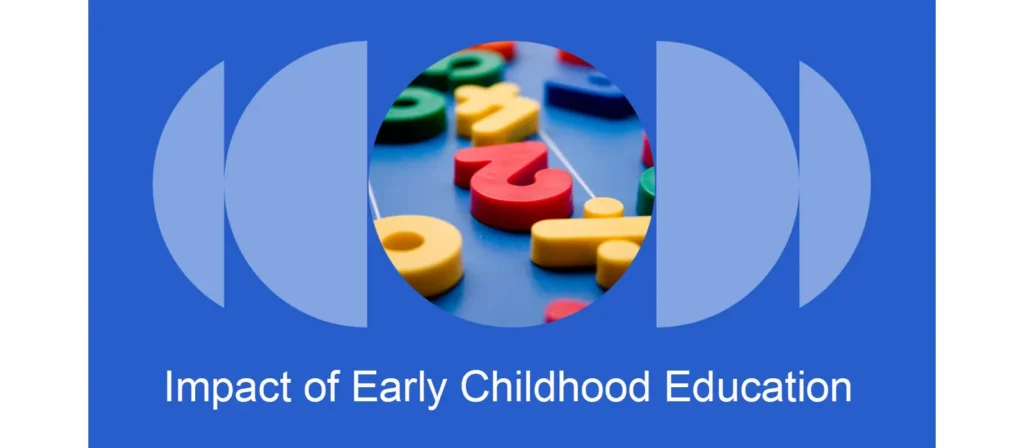
Impact of Early Childhood Education
Early childhood education (ECE) is one of the most impactful investments for a child’s development. High-quality early education programs have proven to shape children’s cognitive, social, emotional, and academic abilities. The early years are a time of intense brain development, and providing children with enriching experiences can set them on a path of lifelong success.
Cognitive Benefits of Early Childhood Education
Early childhood education supports cognitive development domains, particularly in memory, problem-solving, and language development. It provides a foundation for academic achievement and intellectual growth.
- Brain Development: During early childhood, a child’s brain forms millions of connections. Early learning helps stimulate neural growth by exposing children to new ideas, words, and concepts.
- Language and Literacy Skills: Children in quality ECE programs are exposed to a rich vocabulary, enhancing their ability to speak, read, and write effectively.
- Improved Academic Performance: Children who attend preschool tend to perform better academically in elementary school and beyond, thanks to the foundational skills they develop early on.
Social and Emotional Development Domains
ECE programs also foster social and emotional development, teach children how to interact with others, regulate their emotions, and build positive relationships.
- Social Skills: Interaction with peers in structured environments allows children to learn critical social behaviors, such as sharing, cooperation, and conflict resolution.
- Emotional Regulation: Early education programs teach children how to understand and manage their emotions, which is key to mental well-being and social success.
- Empathy and Cooperation: Children in early education learn empathy by understanding others’ feelings, making them more likely to engage in positive and cooperative behaviors.
Long-Term Benefits: Academic and Career Success
The advantages of early childhood education extend far beyond the preschool years. Research shows that children who attend quality ECE programs are more likely to succeed academically and in their careers.
- Higher Graduation Rates: Children who experience quality early education are more likely to graduate high school and pursue higher education.
- Career Success: Adults who attended preschool programs often enjoy better job prospects, higher income, and more stable employment.
- Reduced Special Education Needs: Early intervention in educational settings can address developmental challenges before they become significant, reducing the need for special education later in life.
Economic Benefits of Early Childhood Education
Investing in early childhood education is not only beneficial for individual children but also offers significant economic returns.
- Reduced Social Costs: Children who attend preschool are less likely to engage in criminal behavior, have health problems, or need social welfare, reducing costs to society.
- Increased Workforce Participation: Access to early education helps parents, especially mothers, return to work, boost family income, and reduce dependency on public assistance.
Promoting Equity and Access
Ensuring that all children, regardless of background, have access to high-quality early childhood education is crucial for promoting fairness and equal opportunities.
- Closing the Achievement Gap: Early education provides children from low-income families with the resources to succeed, reducing disparities in academic performance.
- Access to Early Intervention: ECE programs help identify developmental delays early, ensuring children get the support they need to thrive academically and socially.
- Universal Access: For early childhood education to be truly effective, it must be universally accessible, with efforts to provide free or subsidized programs for all families.
Conclusion
Early childhood development is a multifaceted process involving several development domains—cognitive, physical, emotional, language, and adaptive skills. By supporting children in these areas, we ensure they are well-equipped for future learning, social interactions, and emotional well-being. Parents, caregivers, and educators are responsible for providing the best possible environment for children to flourish during this critical period.

